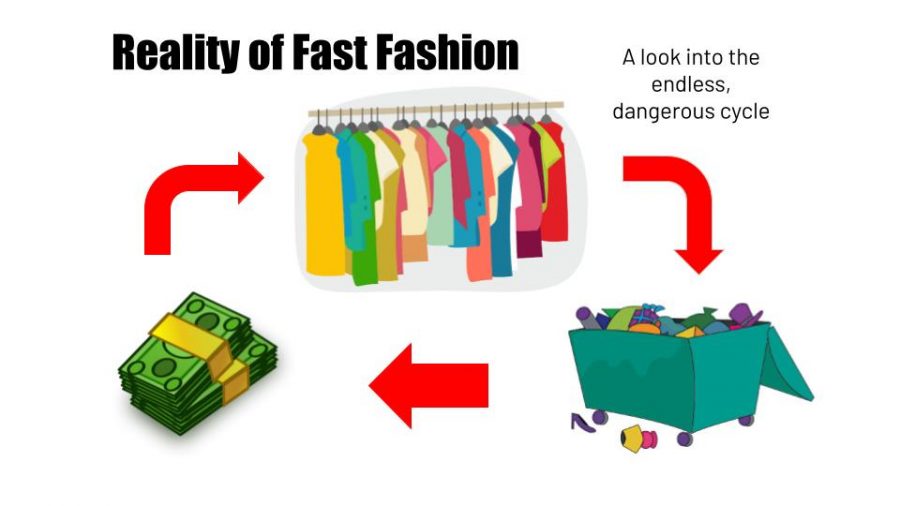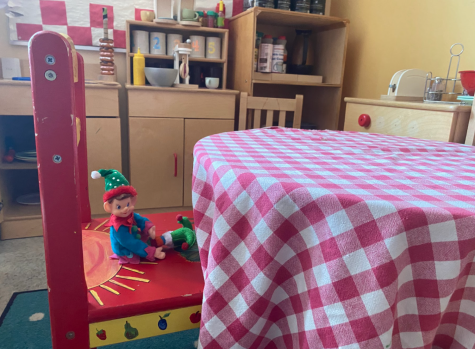Save our planet: Fast fashion moves too fast
Slow down your clothing purchases
Fast Fashion works in a rigorous cycle; consumers buy cheaply made products and then throw them away once the trend fades.
According to Earth.org the fashion industry alone makes up 10% of the world’s carbon emissions and 20% wastewater. Factories work day and night to produce the clothing you are wearing right now. Millions of pounds of clothing end up in the trash due to the selfish demand of our modern world. Landfills and thrift stores are being filled to the brim.
Fast fashion contributes to the problem. “Fast fashion can be defined as cheap, trendy clothing that samples ideas from the catwalk or celebrity culture and turns them into garments . . . at breakneck speed to meet consumer demand,” says writer and activist, Solene Rauturier writing for GoodOnYou, an eco focused brand.
Trends move incredibly fast. This in part is due to celebrity culture as well as due to social media. Because of the constantly moving trends, clothing companies struggle to keep up. The fast-paced mass production of clothing is an attempt for large companies to garner the most money they can from their audience. Most clothes are cheaply made from the flimsiest fabrics.
It is not uncommon for teenage girls to shop at fast fashion brands as those brands tend to be typically prevalent in the lives of many teenagers.
Junior Jordan Shipley said, “It’s hard not to shop for fast fashion brands. Whenever I go to the mall, I’m completely surrounded by fast fashion companies.”
What can you do?
No one is asking you to stop shopping completely, but it is important to keep in mind what you are contributing to when buying from such places. It is also important to know what you can do in order to make a change. Research fast fashion stores and stick to avoiding their

clothing.
It is important to identify and control impulse buying habits. Impulse buying is the impulsive decision to buy a lot of things that you don’t need. It’s estimated that Americans spend a total of $2,916 each year from impulsive purchases. That is a lot of unneeded junk, including clothing.
In order to stop impulse buying, it may be important to exercise self control. If you really feel the need to go on a shopping spree for clothes, try shopping at thrift stores. Thrift stores use clothing already in circulation rather than forcing companies to make new clothes to keep up with demand.
In 2018, the EPA estimated that 17 million tons of clothing waste had been thrown out. Because shopping at fast fashion brands may be inevitable for many, instead of throwing away clothes that you have bought from fast fashion brands, instead try donating. You can donate to places like GoodWill, Plato’s Closet and local thrift stores.
Junior Chloe Kim said, “Thrift stores are really the main and only thing that I do to help recycle clothes which, in a way, I suppose helps somewhat by allowing some of these older clothes to not be thrown out to dumps or wherever.”
It is also important to prioritize your buying, meaning if you can get five cheap shirts that won’t last long for $20 or one well-made shirt that will last longer, choose the more ethical option.
Though it is not an easy option for everyone, try buying from eco-friendly clothing brands. Though they are typically more expensive, they make their clothes in a sustainable way, sometimes by even using recycled material. Eco-friendly brands also treat their workers with respect, unlike most fast fashion brands.
Sweatshops are a huge problem not only in the fashion industry, but everywhere. Popular brands such as Forever 21, Aeropostale, H&M and many more use sweatshops. Not too long ago Fashion Nova, a prevalent fast fashion brand, was exposed for paying some of their workers a wage of as little as $2.77.
While this is something that adds to the unethicality of fast fashion, it is really up to the consumer to decide whether they want to support such harsh working conditions.
Eco-friendly brands to check out include Vetta, Pact, Organic Basics and United by Blue.
Many people have already started taking action as the fast fashion industry continues to grow. Sophomore at Towson University Gabby North said, “I really try to avoid shopping from places that I know mass produce products. I thrift my clothes when I can and take time to educate myself on which brands mass produce and are not ethically sourced.”
Chloe Kim also makes an effort to go against fast fashion. She said, “I try to help put fast fashion to an end by cutting out as much of those clothes as I can by not providing more money to these companies. I try to educate others around me by letting them know that some of the brands they are giving money to and supporting maybe aren’t as beneficial for them as they think, because although it may be cheaper in the end it’s our society and our environment that is suffering.”
If the fashion industry is to continue on its present path, it is estimated that the carbon budget (the amount of carbon dioxide the Earth can hold within a certain global temperature) will increase by 26% by 2050. As climate change rages on and global leaders refuse to act, humanity’s future as a whole is being threatened. Any action you take to lessen the impact fast fashion has on the Earth is better than nothing.
Your donation will support the student journalists of Linganore High School. Your contribution will allow us to purchase camera/recording equipment and cover our annual website hosting costs. We hope to raise enough money to re-start a monthly printed issue of our paper.


















